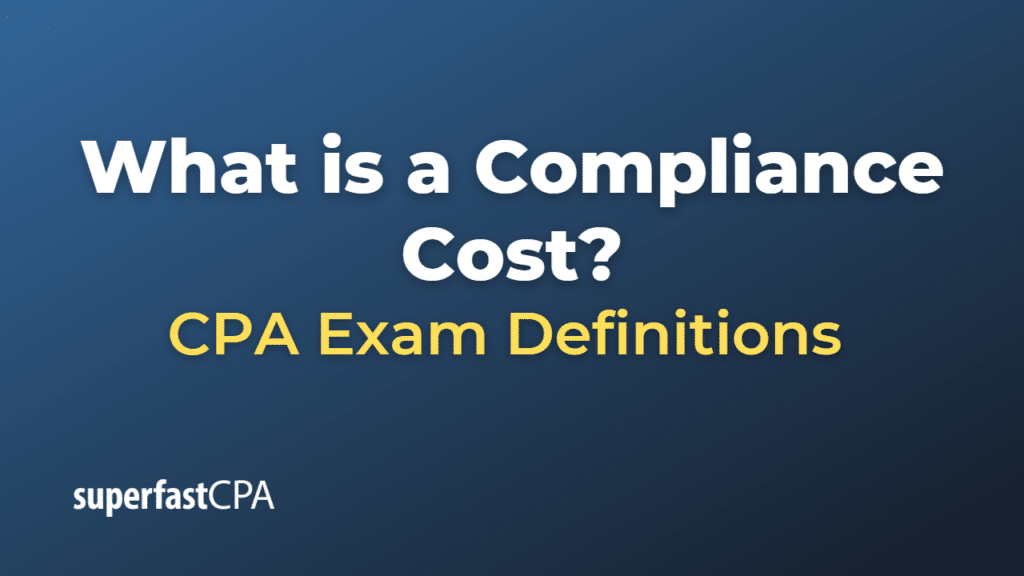Compliance Cost
Compliance cost refers to the expenses incurred by a business or organization to meet the requirements of laws, regulations, industry standards, or internal policies that apply to its operations. These costs are necessary for organizations to ensure they operate legally, ethically, and responsibly within their industry. Compliance costs can include both direct and indirect expenses associated with adhering to the relevant rules and guidelines.
Examples of compliance costs include:
- Direct Costs:
- Implementation of new systems or technology to meet regulatory requirements, such as upgrading IT infrastructure to comply with data protection regulations.
- Hiring and training of personnel, such as a compliance officer, to oversee the organization’s compliance efforts.
- Fees paid to external consultants or auditors to conduct compliance audits or provide expert advice on regulatory matters.
- Licensing fees, permits, or certifications required by law or industry standards.
- Fines and penalties imposed for non-compliance with regulations.
- Indirect Costs:
- Time and effort spent by employees to stay informed about regulatory changes and ensure the organization’s ongoing compliance.
- Lost opportunities due to the need to prioritize compliance activities over other strategic initiatives.
- Reduced efficiency or productivity resulting from the implementation of complex or burdensome regulations.
Compliance costs can vary widely depending on the size and nature of the organization, as well as the specific laws, regulations, or standards that apply to its operations. In some cases, these costs may be relatively minor, while in others, they can represent a significant financial burden for the organization.
It is important for businesses and organizations to carefully consider the potential compliance costs when making strategic decisions and to implement effective compliance management systems to minimize the risk of non-compliance and associated penalties. By investing in compliance efforts, organizations can not only avoid legal and financial repercussions but also demonstrate their commitment to ethical and responsible practices, thereby enhancing their reputation and fostering trust among stakeholders.
Example of a Compliance Cost
Let’s consider a hypothetical example of a financial services company, FinServCo, which needs to comply with various financial regulations and industry standards.
FinServCo is subject to several regulatory requirements, such as the Dodd-Frank Wall Street Reform and Consumer Protection Act in the United States or the European Union’s Markets in Financial Instruments Directive (MiFID II). These regulations aim to promote transparency, protect consumers, and maintain the stability of the financial system.
To comply with these regulations, FinServCo incurs a range of compliance costs, which include:
- Direct Costs:
- Implementation of new IT systems to meet the reporting and record-keeping requirements of the regulations.
- Hiring of a compliance officer and additional compliance staff to oversee the company’s compliance efforts and provide guidance on regulatory matters
- Fees paid to external consultants or law firms to advise on specific regulatory issues or help with the implementation of new compliance measures.
- Licensing fees for the use of specialized software or tools to monitor and manage compliance risks.
- Indirect Costs:
- Time spent by management and employees to stay informed about regulatory changes, attend training sessions, and participate in internal compliance reviews.
- Lost business opportunities due to the need to prioritize compliance activities over other strategic initiatives.
- Reduced efficiency or productivity resulting from the implementation of complex regulations, such as the need to comply with multiple reporting requirements or maintain detailed records of transactions.
While these compliance costs represent a significant investment for FinServCo, they are necessary for the company to operate legally, ethically, and responsibly within the financial services industry. By implementing effective compliance management systems and investing in the required resources, FinServCo can minimize the risk of non-compliance, avoid potential fines and penalties, and maintain its reputation as a trustworthy financial services provider.












